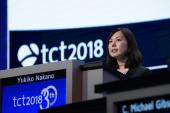Managing AF Patients Undergoing PCI—Some Lingering Questions
The field has more data, but cardiologists still face challenges in deciding when to drop aspirin and what anticoagulant to use.

WASHINGTON, DC—A deep dive into the antithrombotic management of patients with atrial fibrillation (AF) undergoing PCI, held at the recent American College of Cardiology (ACC) 2022 Scientific Session, highlighted the relatively recent consensus between the US and European guidelines. Experts from both sides of the pond emphasized that the default strategy remains oral anticoagulation and a single antiplatelet agent, preferably clopidogrel, for 1 year in the majority of patients.
The discussion’s participants stressed the preference for a non-vitamin K antagonist oral anticoagulant (NOAC) over warfarin and the general recommendation that patients be treated with triple therapy—NOAC plus aspirin and P2Y12 inhibitor—for as short a duration as possible.
Deciding when to drop aspirin should balance the patient’s risk of bleeding with their risk of ischemic and/or thrombotic events, they said.
“I think 7 days on aspirin is something that we can routinely do in many patients,” said Gilles Montalescot, MD, PhD (Centre Hospitalier Universitaire Pitié-Salpêtrière, Paris, France). “Sometimes in low-risk patients, even 1 day of aspirin would be enough because bleeding tends to occur rapidly after the cath lab. This is the WOEST strategy, which is using aspirin at the end of the cath with PCI. On the other hand, in high-risk ACS patients, 7 days of aspirin is probably not good enough and 30 days is probably not good enough either. We may want to prolong antiplatelet therapy in these patients, because we know they may be at risk of ischemic events over 3 months.”
For most patients, triple therapy is only recommended for the periprocedural period, which covers approximately 1 week after revascularization. Experts advise prolonged triple therapy of 1 month in patients at high risk for ischemic/thrombotic events and low risk of bleeding. For the patient at high risk for bleeding, oral anticoagulation plus a P2Y12 inhibitor is recommended for 6 months only, at which point the antiplatelet agent should be stopped.
The North American consensus statement, published last year, and the European recommendations, published in 2020, are largely in agreement given that they are based on the same clinical trials, according to the expert panel. In the past, the recommendations differed given the absence of randomized data, particularly around the optimal duration of aspirin after PCI in patients with AF.
Best Drug? The One Covered by Insurance
In addition to discussing the ideal duration of triple and double therapy, the speakers homed in on which agents might be best in different patients and clinical scenarios. Jacqueline Tamis-Holland, MD (Icahn School of Medicine at Mount Sinai), vice chair for the recent American College of Cardiology/American Heart Association revascularization guidelines, focused on the ideal oral anticoagulant for patients with AF undergoing PCI, noting that the guidelines state it’s reasonable to choose a NOAC over warfarin to reduce the risk of bleeding. That recommendation is based on PIONEER-AF, REDUAL-PCI, AUGUSTUS, and ENTRUST-AF PCI.
“It’s important to point out that three of the trials didn’t give us the information specifically as to whether a direct oral anticoagulant is better than warfarin,” she said, emphasizing that PIONEER-AF, REDUAL-PCI, and ENTRUST-AF tested different strategies of oral anticoagulation. AUGUSTUS, said Tamis-Holland, was the only direct comparison of a NOAC, in this case apixaban (Eliquis; Bristol Myers Squibb), against warfarin in ACS patients with AF undergoing PCI. That trial, which wasn’t powered for ischemic clinical outcomes, showed that apixaban was associated with a reduction in major or clinically relevant nonmajor bleeding.
In terms of the best NOAC to choose, “it’s a little harder to say because there are no randomized, controlled trials,” said Tamis-Holland. There are observational data comparing NOACs in a broad setting of patients with AF (not necessarily undergoing PCI) suggesting no difference in ischemic risk with the different agents, but apixaban may have the edge when it comes to bleeding. “It’s observational data—take it how you want,” she said.
In the real world, though, what matters most is access, she suggested, noting the best NOAC is the one covered by insurance.
What About Clopidogrel Nonresponders?
During the session, Christopher Granger, MD (Duke Clinical Research Institute, Durham, NC), said that the appropriate P2Y12 inhibitor for the majority of patients is clopidogrel. Ticagrelor, he said, might be considered in patients at high thrombotic risk and an acceptable risk of bleeding, but prasugrel is to be avoided. Beyond 12 months, the P2Y12 inhibitor should be stopped and the patients treated with oral anticoagulation alone. Only select patients at the highest risk for recurrent ischemic event and low bleeding should continue with clopidogrel beyond year, he said.
In the Q&A following the presentations, Shaun Goodman, MD (University of Toronto/St. Michael’s Hospital, Canada), questioned whether there were any concerns with clopidogrel as the preferred P2Y12 inhibitor given that there are patients who don’t respond to this agent. “Is this a setting where genetic testing is worthwhile? And how do we reassure patients and physicians that clopidogrel, which most of the time is probably the right choice, is indeed the right choice in contrast with the more potent P2Y12 receptor inhibitors?” he asked.
Dominick Angiolillo, MD, PhD (University of Florida College of Medicine – Jacksonville), who chaired the ACC session and who served as the lead author of the North American recommendations, said they are currently addressing this question in a small, pharmacodynamics study, known as SWAP-AC 2. In the study, patients with an inadequate response to clopidogrel—those with high platelet reactivity status identified with genetic testing, as well as with clinical factors—will be randomized to ticagrelor or clopidogrel for 30 days. It is expected to wrap up later this year.
In the meantime, while there is little data on the benefits of genetic testing, Angiolillo said they routinely test all patients and treat clopidogrel nonresponders with a different P2Y12 inhibitor.
Granger, by contrast, said he doesn’t worry too much about clopidogrel responsiveness except in patients who have had a prior stent thrombosis. “Other than that, we just kind of go with clopidogrel,” he said. “It’s really interesting in Asia, where so many people are low responders, [that] they don’t have more stent thrombosis. There’s not this direct link between the genetic finding and this clinical outcome.”
Ischemic Risk Taken a Back Seat to Bleeding
Despite the wealth of data in recent years, as well as the consensus between different professional bodies, experts believe there is still a need for further clinical trials. In clinical practice, Montalescot noted during his presentation, physicians frequently encounter patients at high ischemic risk, including those with prior stent thrombosis, acute STEMI/NSTEMI, those requiring multiple stents, recurrent ACS, and those with diabetes and multivessel disease, among others. In the trials currently underway, he said, researchers are shifting away from concerns about bleeding to focus on ischemic events.
The EPIDAURUS study, for example, is testing whether prasugrel or ticagrelor for 1 month after PCI in patients is superior to clopidogrel in AF patients also taking a NOAC. The WOEST-3 trial, on the other hand, is studying whether dual antiplatelet therapy (DAPT) with aspirin and a P2Y12 inhibitor—and no oral anticoagulation—in the first month is safe and effective when compared against standard therapy with short-course aspirin, a P2Y12 inhibitor, and oral anticoagulation. The ADONIS-PCI trial is looking at use of ticagrelor versus aspirin and clopidogrel in ACS patients with AF, while OPTIMA 3 and 4 is also studying optimal antithrombotic therapy in an ACS population. Finally, the SCA-FA study is testing whether oral anticoagulation can be held off unless recurrent AF is detected with an implantable cardiac monitor—if it is not detected, patients only receive DAPT (the comparator arm is standard anticoagulation).
Angiolillo was surprised at the number of ongoing trials in the space and expressed concern that many of the studies were small, limiting their ability to provide definitive evidence to guide clinical practice. Montalescot, in turn, acknowledged the limits of these trials yet predicted they will still have an impact.
“Most of these studies are around 2,000 to 3,000 patients, and we will get information from several independent studies looking, in general, at the ischemic risk of these patients,” he said. “I think we need this information. We have been very much focused on the bleeding risk in the past, but we still have a question about the ischemic risk when we remove one of the antiplatelet agents.”
Michael O’Riordan is the Managing Editor for TCTMD. He completed his undergraduate degrees at Queen’s University in Kingston, ON, and…
Read Full BioSources
Antithrombotic management of patients with atrial fibrillation undergoing PCI. Presented at: ACC 2022. April 2, 2022. Washington, DC.
Disclosures
- Tamis-Holland reported no relevant conflicts of interest.
- Granger report consulting fees/honoraria and/or research grants from AbbVie, Daiichi Sankyo, GlaxoSmithKline, Merck & Co., Novo Nordisk, Novartis, NIH, FDA, Bayer, REATA, AstraZeneca, Abiomed, Akros, Boston Scientific, Medscape, Cardionomic, Janssen, Medtronic, Bristol Myers-Squibb, Roche, Pfizer, Phillips, Boehringer Ingelheim, Correvio, Espero, CeleCor, Hengrui, Alnylam Pharmaceuticals, and Anthos.
- Angiolillo reports consulting fees/honoraria from Amgen, Bayer, Chiesi, Sanofi, Eli Lilly, Daiichi-Sankyo, The Medicines Company, AstraZeneca, Abbott Vascular, Pfizer, and PLx Pharma. He serves as a DSMB member for trials (and reviews honoraria) from Celenova, Johnson & Johnson, St. Jude, and Sunovion. He reports institutional grant support from Amgen, GlaxoSmithKline, Eli Lilly, Daiichi-Sankyo, The Medicines Company, AstraZeneca, Janssen, Osprey Medical, Novartis, CSL Behring, and Gilead.





Comments